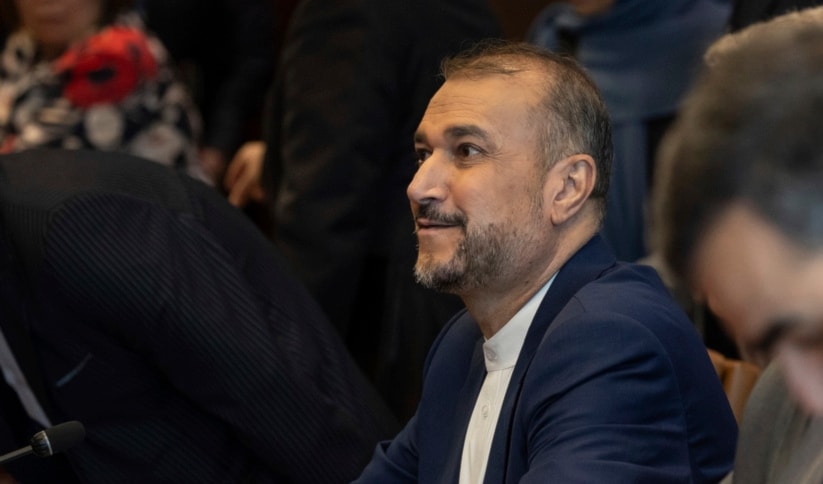West asked Iran to take it easy on 'Israel' in True Promise: Iran FM
The collective West attempted to influence Iran to retaliate at a low intensity against "Israel", ahead of Operation True Promise, according to Iran's Foreign Minister.
-

Iran's Foreign Minister Hossein Amir-Abdollahian attends a meeting with United Nations Secretary-General Antonio Guterres at United Nations headquarters, on Thursday, April 18, 2024. (AP)
Iran's Foreign Minister Hossein Amir-Abdollahian revealed that ahead of Operation True Promise, the West asked Tehran to be restrained and dilute the intensity of any retaliatory attack against "Israel" after the occupation assassinated seven of Iran's officials in Syria.
"Ahead of the operation, the request of the Westerners was that if you want to respond, do not hit hard and reduce the intensity of the operation," the top diplomat said in a cabinet briefing on Wednesday.
Amir-Abdollahian said that ever since Iran declared that it would retaliate against "Israel's" attack on its consulate in Syria, the United States and its Western allies rushed to request a low-intensity response. However, Iran made its decision and conducted its operation independent of any external influence or pressure.
Iran's reply to the West's request was "that the root [cause] is in the Gaza crisis that should be resolved and they should focus on that issue."
He also noted that the United States and regional countries hosting US military bases were forewarned of the retaliatory attack, adding that although Iran was initially responding to "Israel's" crime, it would also respond to the US if any of its bases were mobilized against Iranian assets in the region.
To Arab countries hosting US bases, Iran affirmed the brotherly nature of relations but stated that they [bases] would be targeted if the US "makes the slightest mistake." Amir-Abdollahian added, however, "Most of the neighboring countries told us that they will not allow any country to launch acts of aggression against Iran from their soil.'
Positive signs for a ceasefire
The foreign minister further stated that a ceasefire in Gaza would be reached if the West fulfilled its vows. "We had an unwritten agreement with the Western parties to focus on the ceasefire in Gaza, and the Westerners said they would move in this direction and, today, positive signs have appeared in this regard."
The top Iranian diplomat also cautioned that Israeli Prime Minister Benjamin Netanyahu and the extremists within his government prefer dragging the war because they believe that if it is ended, a new crisis in the occupied territories would be born.
Earlier on Monday, Amir-Abdollahian held a phone conversation with Ismail Haniyeh, the head of the political bureau of Hamas, during which the two discussed the latest developments regarding the Israeli war on the Gaza Strip.
Haniyeh thanked Iranian leader Sayyed Ali Khamenei, President Ebrahim Raisi, and the Iranian people for their stance in support of Palestine and Gaza, the top Iranian diplomat wrote on social media.
Amir-Abdollahian said the Hamas leader confirmed the movement agreed on a ceasefire proposal presented by mediators Egypt and Qatar to stop the Israeli aggression, complete a prisoner exchange deal, and lift the siege imposed on the Gaza Strip.
"Now the ball is in the opposite side's court," the Iranian Foreign Minister said.

 3 Min Read
3 Min Read










